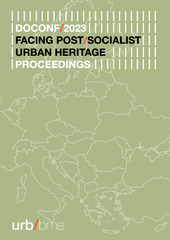Приказ основних података о документу
The Impact of Mixed Culture on Open Public Spaces in urban areas: A Case Study of Mega - Block 70, New Belgrade
| dc.creator | Lokas, Iva | |
| dc.creator | Đukanović, Zoran | |
| dc.creator | Marić, Jelena | |
| dc.date.accessioned | 2023-12-04T13:11:43Z | |
| dc.date.available | 2023-12-04T13:11:43Z | |
| dc.date.issued | 2023 | |
| dc.identifier.isbn | 978-963-421-932-3 | |
| dc.identifier.uri | https://raf.arh.bg.ac.rs/handle/123456789/1779 | |
| dc.description.abstract | Public spaces are important in the cultural landscape of a city, as they provide opportunities for social interaction, recreation, and civic engagement. The way these spaces are designed and managed has a significant impact on their use and meaning. This paper explores the influence of mixed culture on open public places, focusing on housing mega-blocks – the „Block 70“ in New Belgrade as a case study. Block 70 is a mixed-use development that includes residential, commercial, and cultural facilities. It is located in one of the most prominent areas of New Belgrade, which has undergone significant transformation in recent years. The study uses a combination of quantitative and qualitative methods to analyze the cultural influences on the use and perception of open public spaces in Block 70. The paper begins by providing an overview of the theoretical framework for understanding the relationship between culture and open public spaces. It highlights the key concepts of cultural identity, social practices, and the role of the cultural impact seen from the aspects of urban design that is shaped and redefined by diferent cultural trends. The study then presents the results of a survey conducted among the residents of Block 70, first shown in non published paper which examines their perceptions of the cultural influences on urban design in open public spaces. The survey results indicate that the cultural diversity of the residents is reflected in the use and perception of open public spaces in Block 70. The study identifies several cultural factors that influence the use of these spaces, including social norms, gender roles, and cultural traditions. For example, women tend to use the public spaces in Block 70 less frequently than men, due to cultural norms that dictate their roles in open public spaces. The paper also examines the architectural features of Block 70 and their impact on the use and perception of public spaces. Additionally, the study highlights the importance of creating inclusive and accessible open public spaces that reflect the cultural diversity of the community. The findings of this study have implications for urban planners, designers, and policymakers, as they seek to create public spaces that promote social interaction, civic engagement, and cultural exchange. | sr |
| dc.language.iso | en | sr |
| dc.publisher | Budapest : Department of Urban Planning and Design, Faculty of Architecture Budapest University of Technology and Economics (BME) | sr |
| dc.rights | openAccess | sr |
| dc.source | DOCONF2023 - Facing post-socialist urban heritage : conference proceedings, 5-6-7th October 2023, Budapest | sr |
| dc.subject | open public spaces | sr |
| dc.subject | culture | sr |
| dc.subject | transformation | sr |
| dc.subject | mega block 70-New Belgrade | sr |
| dc.title | The Impact of Mixed Culture on Open Public Spaces in urban areas: A Case Study of Mega - Block 70, New Belgrade | sr |
| dc.type | conferenceObject | sr |
| dc.rights.license | ARR | sr |
| dcterms.abstract | Марић, Јелена; Ђукановић, Зоран; Локас, Ива; | |
| dc.rights.holder | BME Department of Urban Planning and Design, 2023. | sr |
| dc.citation.spage | 250 | |
| dc.citation.epage | 259 | |
| dc.description.other | http://doconf.architect.bme.hu/ | sr |
| dc.identifier.fulltext | http://raf.arh.bg.ac.rs/bitstream/id/5958/bitstream_5958.pdf | |
| dc.identifier.rcub | https://hdl.handle.net/21.15107/rcub_raf_1779 | |
| dc.type.version | publishedVersion | sr |

